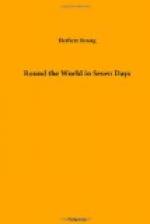“Where did you get that old rattler?” asked Smith, laughing.
“Oh, several came out here a year or two ago; bought up cheap when the Commissioner of Police couldn’t stand ’em any longer. They’re always breaking down. No doubt your petrol is inside, and you may think yourself lucky it has got here.”
The car came to a stand: the Turks on the roof retained their places; those within lugged out the cans of petrol and oil, and placed them in the aeroplane at Rodier’s direction. Smith meanwhile was chatting with the Englishmen, fending off their questions as to his destination.
“I may send you a wire from my next stopping-place,” he said. “That reminds me. Will you send a wire to Barracombe for me, Johnson? You know his address. And one to my sister at home. I promised I would let her know. Simply say ‘All well.’ Now can you get the captain to clear the course for me?”
The captain and his men took a long time over this business, and Smith longed for a few London policemen to show them how to do it. But the excited crowd was at length forced back so far as to allow a sufficient running-off space. Smith shook hands warmly with the Englishmen; with Rodier he took his place in the car; then at a jerk of the lever the aeroplane shot forward, and, amid cries of “Good luck!” from the Englishmen, clapping of hands and loud “Mashallahs!” from the excited mob, it rose gracefully into the air.
“Only five minutes late, mister,” said Rodier. “All goes well.”
CHAPTER V
THE TOMB OF UR-GUR
Charles Thesiger Smith was not one of the romantic, imaginative order of men. Even if he had been, the speed at which he travelled over the Bosphorus gave scant opportunity for observation of the scenes passing below. He had no eye for the tramps, laden with grain from Odessa, coming down from the Black Sea; for the vessels of ancient shape and build, such as the Argonauts might have sailed in when questing for the Golden Fleece; for the graceful caiques rowed by boatmen in zouaves of crimson and gold, in the sterns of which the flower of Circassian beauty in gossamer veils reclined on divans and carpets from the most famous looms of Persia and Bokhara. These visions touched him not: he was crossing into Asia Minor, a country of which he knew nothing, and his attention was divided between the country ahead and the map with which Barracombe had nefariously provided him.
The next stage of his journey, the first place where a fresh supply of petrol awaited him, was Karachi, in the north-west corner of India. It was distant about 2,500 miles. A gallon of petrol would carry him for forty-five miles, and his tank had a capacity of eighty gallons, so that with good luck he would not need to replenish it until he reached Karachi. Though he hoped that his own endurance and the engine’s would stand the strain of the whole distance without stopping, he had chosen his course so that, if he felt the necessity of alighting for brief intervals, he might at least find pleasant country and amicable people.




